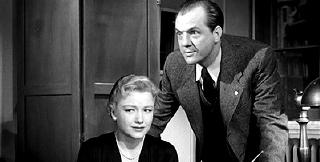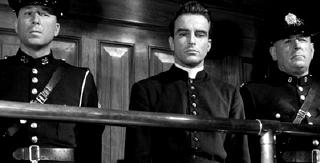Wed 17 Dec 2008
I CONFESS. Warner Brothers, 1953. Montgomery Clift, Anne Baxter, Karl Malden, Brian Aherne, O. E. Hasse. Screenplay: Paul Tabori, based on a play by Paul Anthelme. Director: Alfred Hitchcock.
Every movie director has a film or two that the general consensus is that they’re not among his best. That seems to be the case for I Confess, the last black and white movie that Hitchcock made, except for Psycho, as everybody who comments on this fact is equally quick to point out.

Filmed in Quebec and largely, if not entirely on location, it may be the subject matter that wasn’t fully understood, say some.
Montgomery Clift plays Father Michael William Logan, who’s put in a moral and ethical dilemma when a handyman for the church where he’s a priest confesses to a murder that he’s just committed.
Unable to reveal the killer’s identity to the authorities, represented primarily by the overly adversarial Inspector Larrue (Karl Malden), nor even a hint, Father Logan’s predicament becomes personal when he ends up accused of the crime himself, and still not able to say a word. (It may not have been intended, but I think Malden looks awfully devilish in the photo below. What do you think?)

While I’m reluctant to say more, it seems that there was a girl in his past, and the girl knew the dead man.
And the real killer (O. E. Hasse), while panicky and frightened in the beginning, seems to take more and more pleasure in reminding Father Logan that he is not allowed to say a word.
The connections between the primary characters are in fact probably too complicated — there’s an over-reliance on coincidence, required only to make the story work — and Father Logan is probably too committed to his principles for audiences to understand. “Why doesn’t he … ?” they had to be thinking back then, when the movie first came out.

Not only then, but now, I admit it. Questions like these were certainly in my mind, and I didn’t have to work hard at it.
This, quite naturally, led to growing frustration with Mr. Hitchcock when there wasn’t (I felt) enough explanation or spelling out why indeed Father Logan doesn’t do this or that, or more correctly, can’t, even when the case goes to trial.
Most courtroom cases in the movies do not seem all at real, and this is another of them. I also didn’t care for the shootout scene at the end. Anything else? No, but other than the reservations I’ve already stated, I did like the movie, and maybe more than other people have. I even recognized Mr. Hitchcock’s portly profile at the beginning of the film, so I was also happy about that.
December 17th, 2008 at 3:22 pm
I know what you mean about I CONFESS. But, like yourself, I found that I still liked the movie quite a bit. On top of the great cast, I really liked the atmosphere of the film, and the authentic feel of the location photography. Plus, Hitchcock is so good that even from the most mediocre script he can pull off a pretty good movie.
-Cullen
http://www.pulpserenade.blogspot.com
December 17th, 2008 at 4:17 pm
Thanks, Cullen. It doesn’t sound as though there’s much difference between our opinions on this movie. Flawed, maybe, but still very good.
I also followed the link to your blog, then on to your review of Fox’s recent Murnau and Borzage set of DVD’s:
http://www.thelmagazine.com/lmag_blog/blog/post__12160802.cfm
A few of us were discussing this here in the comments following an earlier post. The set is pricey, but by all accounts — including yours, I was pleased to read — it’s worth it.
— Steve
PS. I just discovered that comments aren’t searchable in the box to the right. The post I was referring to is this one: https://mysteryfile.com/blog/?p=864
December 17th, 2008 at 6:03 pm
I just viewed Man’s Castle which is not in the Frank Borzage box set but is a fascinating pre code film starring Spencer Tracy and Loretta Young. This 1933 pre code movie actually shows all sorts of scenes the code would forbid a year later: nude skinny dipping, no punishment for a killing, two people(man and woman) in the same bed, unmarried pregnancy, and unmarried couple living together. You have to wonder what were they thinking when they censored such everyday facts of life.
December 17th, 2008 at 6:27 pm
It’s not a movie I’ve seen, Walker, but I’ve heard it called a classic in terms of showing what life was really like during the Great Depression. I’ll make a point of finding a copy. Thanks for recommending it!
— Steve